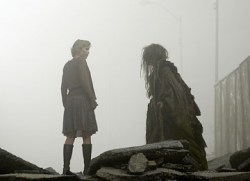Shopgirl
 Two movies live in Shopgirl. One is a creepy but strangely touching May-December romance between Claire Danes and Steve Martin. The other stars Danes and Jason Schwartzman in a screwball comedy, with an intrusive, superfluous voice-over. The first of these movies is surprisingly good; the second sucks.
Two movies live in Shopgirl. One is a creepy but strangely touching May-December romance between Claire Danes and Steve Martin. The other stars Danes and Jason Schwartzman in a screwball comedy, with an intrusive, superfluous voice-over. The first of these movies is surprisingly good; the second sucks.
I haven’t read the novella on which the script is based, but I can’t imagine that the book works much better than the movie. (Martin wrote both, and produces the movie, too, along with acting and providing that infrequent narration. Strangely, Anand Tucker directs; Steve Martin sure is lazy.) Shopgirl the film is tonally bifurcated, an irreconcilable combination of Lost in Translation and L.A. Story, and the sensitive, observant, and nonjudgmental relationship picture is sabotaged by the broadly whimsical movie, as well as by an oppressively romantic score.
Danes is spectacular in Shopgirl, with a stunning emotional accuracy offered subtly through seemingly natural expression; she’s nearly transparent, in the best possible way. She holds the two movies together, comfortable while a vacant Martin underacts and the hyperactive Schwartzman overacts.
Her Mirabelle is a gorgeous creation, a young woman who mistakes her own decisiveness for intelligence and wisdom. Her confidence in her own choices is heartening, even though the decisions themselves are sometimes downright troubling. She holds your attention and grabs your heart in a movie that’s otherwise a series of unfortunate miscalculations.
Schwartzman’s charmingly maladjusted Jeremy Kraft is (along with his character in I ♥ Huckabees) another possibility in the garden of forking paths that might be Max Fischer’s future. When Mirabelle agrees to have sex with him, she asks if he has a condom. He volunteers to use a plastic bag, and finally borrows a rubber from a neighbor. After Mirabelle dumps him for Martin’s wealthy Ray Porter, Jeremy goes on a bafflingly out-of-place detour with a rock band, and he takes the movie with him.
In playing Porter, Martin acts cool and distant but also urgent, as if he never left The Spanish Prisoner. He provides Mirabelle with all she could want materially, and he’s refreshingly direct in saying what he wants, but he’s unable to express emotion or commit in any meaningful way.
Yet his faults contribute to his mystery, and the romance appears genuinely fulfilling and exciting to both of them. What Shopgirl gets right more than anything is showing how such a mismatched pair could find at least temporary bliss.
Danes deserves most of the credit for that connection, because without her Martin’s Ray would seem like something of a predator, albeit well-mannered. In an open and honest performance, Danes convinces the audience that Mirabelle finds things to love about him beyond his money and his dick, and because she’s so present, we accept her judgment even in the absence of evidence that it’s justified. And while her expectations and hopes were obviously grand and unrealistic, my heart still broke along with hers.
Fortunately, she recovers, and finds an age-appropriate partner who has cleaned up some of his eccentricities to become nearly normal. Yes, she hooks up again with Bag Boy.
Mirabelle can’t know, of course, that on his tour-bus adventure, Jeremy has educated himself (in the book sense) on the ways of women and romance, and has buffed his rough edges instead of actually changing. This is yet another relationship destined to end badly, and – by itself – that’s refreshingly realistic, and not at all depressing. Jeremy seems mostly harmless, and we know Mirabelle well enough to reasonably expect that she’ll pick herself up, dust herself off, and move on to her next man.
But with its incongruously bright tone, the movie seems to want us to be cheered that she’s traded one kind of man trouble for another. Shopgirl, perhaps like Ray Porter, has no idea what it’s missing by mistreating dear Mirabelle so.
Silent Hill
 Knowing that Silent Hill is based on a video game certainly affected the way I watched it; the movie doesn’t make any more sense knowing the origin, but at least it explains why it makes no sense.
Knowing that Silent Hill is based on a video game certainly affected the way I watched it; the movie doesn’t make any more sense knowing the origin, but at least it explains why it makes no sense.
A siren sounds and our heroine, who is in mortal danger, is somehow transported somewhere else, where she will soon face new peril. Outside of a David Lynch film, where you might expect such things, this is illogical. (It doesn’t make sense in a Lynch movie, either, but there you just shrug and go along with it.)
Essentially, Silent Hill – directed by Christophe Gans (Brotherhood of the Wolf) and written by Roger Avary (Pulp Fiction) – is crudely mimicking game play. The protagonist might not have completed a certain task to reach the next level, but she has apparently outlasted the clock, and so she moves forward through the game’s “story.”
The movie’s primary flaw is that it doesn’t go nearly far enough in this direction. Instead of creating an abstract, expressionist work – with disconnected images sharing little more than a tendency to distress and displace the viewer, like the Brothers Quay – Gans and Avary try to fuse the art-house flick they clearly wanted to make with a conventional horror-movie narrative, in which the source of the strange goings-on must be explained at length.
Silent Hill suggests – but finally abandons – a new set of rules for the cinema when it’s drawn from a video game. Plausibility, logic, and narrative table-setting are all optional; in their place is an immersive experience.
The difference between a video game and a movie, of course, is that games are active while watching a film is passive. Yet that gulf can work to the advantage of video-game-based horror movies; the lack of control over the outcome, and the failure of one thing to flow naturally from another, are perfectly suited to a nightmare.
In Silent Hill, the setup is so quick, clipped, and rote that you can’t help but abandon any hope that it might make sense. A girl is sleepwalking, and she sometimes says “Silent Hill.” So her mother wisely seeks and takes her daughter to Silent Hill, a community that was abandoned 30 years ago because, we are told endlessly, of an underground coal fire that still burns. The sky rains ashes – just like Schindler’s List but without that unpleasant Holocaust baggage.
Gans has given the movie a murky, grimy, alien texture, and has done a good job of making it look organic rather than digital for the most part. It’s not an entertaining movie, but it’s effective at creating anxiety primarily through image.
But Silent Hill’s makers don’t trust the less-is-more approach to horror. While there’s a great deal of ambiguity throughout the movie, the core backstory is explicated toward the end, and it’s about witches and religious fundamentalists. That’s the best they could do?
In fairness, it’s unlikely any explanation would have satisfied me, but that’s the point. As Roger Ebert perceptively wrote in a typically dismissive pan:
“Although I did not understand the story, I would have appreciated a great deal less explanation.”

